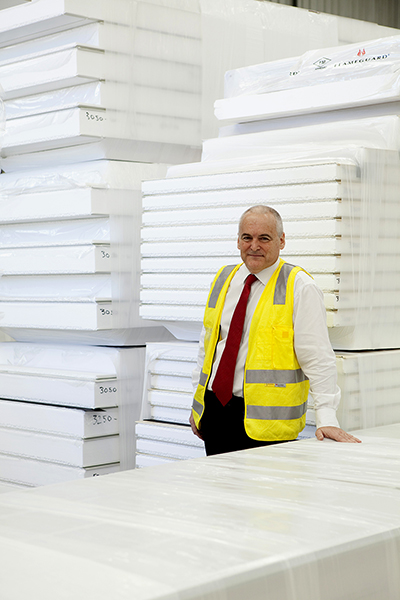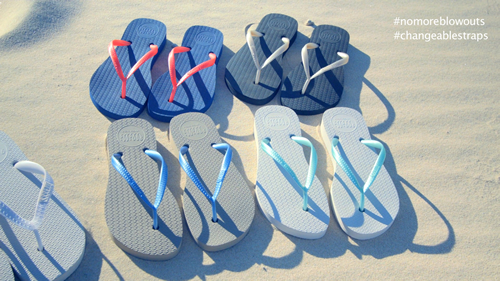EXTRA >>
DO NOT tell Australian insulated construction panel specialist, Bondor, that manufacturing in this country has a bleak future. Bondor has a completely different story to tell of increasing demand because of the improved construction and energy usage efficiencies to be gained from incorporating its products.
Bondor has manufacturing plants in most capital cities across Australia and is best known for its EPS-FR insulated steel panels – with a core of expanded polystyrene with fire retardant – used primarily to develop cold rooms and chilled areas in major supermarkets and food and beverage storage facilities. BondorPanel has, in fact, become a generic term in the construction industry.
But in recent years Bondor has, in conjunction with Bluescope Steel and Dulux, designed and developed a new generation of insulated wall and roofing panel systems that look set to transform construction in several areas – particularly new home builds, renovations and commercial offices. 
A test home construction at Burpengary, north of Brisbane, was the proving ground that set innovative builders around the country talking – especially as it was monitored closely by a university research team for 12 months. The results have set Bondor on a new trajectory and seen the company develop new relationships with builders, architects and engineers.
“We developed, along with Dulux and Bluescope, a product that would allow you to build a house completely out of insulated panel,” Bondor general manager Geoff Marson said.
“Our prototype house in Burpengary had all walls, ceiling and other features made out of this panel. Framing, insulation in the walls, external cladding and your internal coating such as Gyprock – we replace that all with one product called InsulWall which is essentially the steel with insulation bonded to it. We replace the roof trusses, ceiling and a roof sheet and insulation all with one panel as well.
“So you can get much greater spans and that’s one of the things architects and building designers like about it. It really opens up the living space and makes it nice and light and airy and away you go.”
Mr Marsdon said Bondor was “very happy” with both the way the home it looked and the way it performed. Plus there were major savings in build time and cost.
“We can take 30-odd percent off the build time of a house with that. It changes the mix of trades you need there – you don’t necessarily need all the trades, like brickies and that sort of thing. You just need a crew that’s trained in standing panel.”
Another time saver is the incorporation of service ducts within the panels, again saving trades time.
“Part of the system we’ve developed is there’s a service duct – we’ve developed a system for the plumbing and the wiring.
“We had a family of four live in this for 12 months. They were the subject of a study by QUT (Queensland University of Technology). They found that the average energy cost for them was the equivalent of 44 cents a day.”
In fact, QUT’s Science and Engineering Faculty team leader, Dr Wendy Miller regularly takes students to look at the house as part of their training. They take thermal imagery of the home to study its performance. In Queenslander or brick veneer homes, thermal imagery usually reveals large gaps in insulation and energy leaks, particularly between the ceiling insulations and the ducting. The Bondor system eliminates such thermal leakage.
“It’s the same product that’s used in a freezer, basically, so the advantage you get is that when you join the panels together you get an airtight seal,” Mr Marsdon said.
“Because the core is bonded to the steel, your insulation does not sag or crumble or deteriorate over time. That’s why you get better performing insulation.
“It also works that way in supermarkets – for example – so you have the same advantages across all environments that need air conditioning, whether it is an office or a supermarket or a commercial premises.
“Same goes for a house. It is just that we have not been in the housing market previously.”
Mr Marsdon said Bondor worked with Bluescope “so we would get away from the steel look”.
“We have a finish on this steel that Bluescope developed for us that allows you to paint or texture directly to the steel face,” he said. “That gives a rendered look on the outside and you can paint the internal face as well.
“We wanted to develop something indistinguishable from a normal house – it looks great because of the design, but you would not pick that it is made out of something different.”
Mr Marsdon said the entire system was based on Bondor’s new polyisocyanurate (PIR) cores and with a greater range of finishing options, the new roof and panel systems are helping to met demand for more environmentally friendly construction materials, greater roofing spans and
BRAND BUILDERS
The new products have several different brand names – Equitilt FlameGuard, MetecnoPanel, InsulWall, SolarSpan, MetecnoSpan, Purline and Equideck -- all made by Bondor, and they are starting to crop up on some iconic nation projects as well, including the latest energy-friendly National Cricket Centre in Brisbane and the Adelaide Crows headquarters.
The PIR-centred products are all made at a new manufacturing line and research facility at Acacia Ridge, the Bondor headquarters. Other products are produced at manufacturing plants around the country.
“PIR is a process that came out of eurythane chemistry, which was developed by the Germans in the 50s and 60s and it has found its way into different types of things,” Mr Marsdon said. “This is actually very big in Europe and the US but it’s capital intensive and requires big dollar investment.
“We have one PIR line and two EPS lines here and we have one EPS line in every capital city, plus in Tasmania as well. So we manufacture in six states and we have construction teams in six states as well.”
Mr Marsdon said a thriving use for the new insulated panel has been relocatable buildings, meeting the needs of the mining industry. The main challenge, he said, was educating the industry about the advantages – and that often required major system changes for some companies, making adoption slower.
“Educating the industry – we have put a lot of effort into talking to builders and designers,” Mr Marsdon said.
“We’ve found our best target market is not the bigger project guys, because they have their models and systems. It’s more the guys outside of that, the builder who is going to build 50 homes a year. The guy who gets involved in it himself and understands how a home goes together – they are the guys most interested because for those guys, taking the time off construction is a real benefit to them.
“We are working with a number of builder networks around the place. We have training programs that we run and give them a certificate to say they are trained in how to use the system.”
Mr Marsdon said the transformation could help builders in other areas of their business, such as raising their profiles and boosting marketing.
“We have a whole marketing kit that goes along with it,” he said. “We are there to try to help them differentiate themselves in the market. It’s really starting to get some take-off.”
So far, prestige home builders in Tasmania and Melbourne have showcased the product. Mr Marsdon said the Tasmanian project drew so much interest that it sold within three weeks of completion., who did one on spec and he sold it in three weeks. “He was pretty excited about that.”
A stylish eight-star energy rated home by Marcel Mott of Whittlesea’s DTC Family Builders, using Bondor’s InsulWall and SolarSpan thermal building products, has been something of a local sensation.
A roofing refit at the popular Perth restaurant, The Naked Fig, also garnered publicity. So did a Gold Coast company that completed 14 relocatable houses for a mining town.
“He assembled them, kitted them out and stuck them one on top of the other on the back of a truck and delivered them. When he got them there all he did was put the Solar Span roofing between them. People are doing some very interesting things with designs.”
TV APPEARANCE
The Burpengary home garnered great publicity, featuring twice on Today Tonight and the house built in ’10 days’.
“It is not the 10-day house, (Today Tonight) got a bit carried away with that … but certainly much quicker than normal home construction,” Mr Marsdon said.
“That drew a lot of enquiry from people talking to builders about building such a house. In fasct, that is still filtering through. It was in the tens of thousands of calls. Fortunately we had ramped up our website …”
However, leading the market in new products requires a special determination, even for a successful company like Bondor.
“You get a few scars,” Mr Marsdon laughed.
The publicity did have an immediately beneficial result for Bondor’s future product development.
“That gave us confidence to create our own testing facility for doing structural and cyclonic testing,” he said. “We now have a few other products in the pipeline that we are testing using that facility.
“Trying to get things tested (had previously been) a bit of a bottleneck. We’ve got a team of people working for us in that area now and we can bring things to market in half the time.
“With your own facility you can really optimise the products and do a lot more tweaking and get the best out of them.”
The laboratory performs 10,000 cycles of high pressure and low pressure stress testing, using air bags and computers, to emulate cyclonic conditions. The lab is near the PIR line at Acacia Ridge.
“We are very conscious of the fact that in North Queensland you have to be much more stringent in what you are designing and the quality of what you produce to withstand the weather conditions.”
That careful approach seems to be paying off as Bondor now exports to New Zealand, Papua Nw Guinea, and the Pacific Islands.
“We have also completed orders to Pakistan and to Sri Lanka … it was a major hospital in a military complex. We are seeing military accommodation opportunities open up too.”
The drive for greater energy efficiencies in buildings is becoming the big driver for Bondor.
“With the changes in building regulations and people being more interested in energy efficiency, we think that is only going to grow because energy charges will inevitably go up, so we think that this product’s time has come,” Mr Marsdon said.
“The Germans are always talking about net-zero energy and certainly with this we’ve got a real potential – we are pretty close to it,” Mr Marsdon said
“A small photo-voltaic on top of a house like that and you are pretty much self-sufficient.”
www.bondor.com.au
ends

 How to resolve AdBlock issue?
How to resolve AdBlock issue? 




